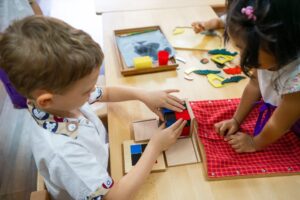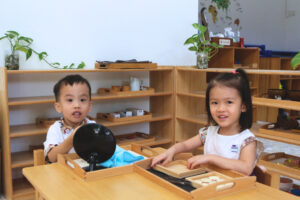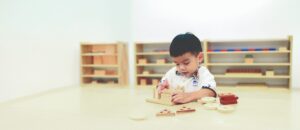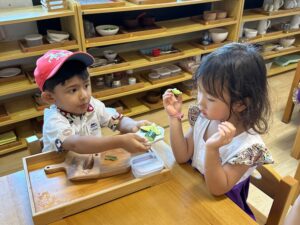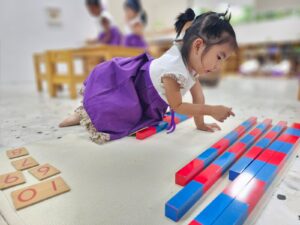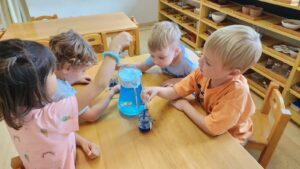Water play is more than just fun—it’s a powerful way for young children to learn. As they pour, scoop, and splash, they’re not only engaging their senses but also building essential skills in focus, coordination, and emotional regulation.
Guided by Montessori principles, House on the Hill incorporates water play activities for preschoolers into daily routines. These rich moments of sensory exploration encourage children to learn at their own pace, with deep concentration and joy. Over time, these experiences lay the groundwork for lifelong growth, supporting everything from motor development to social-emotional awareness.
Water Play Through a Montessori Lens
To understand how water play supports early child development, it’s helpful to look at it through the lens of Montessori education, which is an approach grounded in the belief that children are naturally curious and capable. When placed in a carefully prepared environment, children feel a desire to engage with materials in ways that feel purposeful and meaningful to them.
Unlike traditional classroom settings, Montessori educators act as guides rather than instructors. Their role is to prepare and observe, allowing the environment and the child’s natural drive to explore to lead the learning process.
Benefits of Water Play Activities for Preschoolers
It may seem simple, but every splash, swirl, and pour is rich with learning. As children explore freely, they are also developing essential motor, social, emotional, and cognitive skills—all aligned with their stage of growth.
1. Strengthening Fine and Gross Motor Skills
Whether scooping, pouring, or squeezing, water activities naturally support muscle development and coordination. For example, our Practical Life activity using small pitchers teaches children how to pour water from one vessel to another with care and control. As they steady their hands and refine their movements, they strengthen fine motor skills and hand-eye coordination, building confidence and mastery through repetition and focus.
2. Building Early Numeracy and Scientific Thinking
Water play naturally introduces early concepts in maths and science in the most hands-on way. Children explore volume, buoyancy, and measurement by experimenting with water. A classic sink-or-float activity using leaves, stones, and blocks invites them to predict, observe, and classify—fostering curiosity, logic and a love for discovery, all without pressure.
3. Encouraging Social Interaction and Emotional Regulation
Water hars a naturally calming quality. The soothing movement of water can help children feel grounded, providing a gentle sensory experience that supports emotional regulation when they’re feeling overwhelmed or full of energy.
At the same time, shared water play teaches cooperation. Whether washing toys or engaging in the same activity, they learn to take turns, share space, and communicate with kindness. These everyday moments build patience, empathy, and the ability to work well with others.
Water Sensory Activities for Preschoolers
Water play doesn’t need to be elaborate to be meaningful. With just a few common materials, children can enjoy rich sensory experiences both indoors and out. Here are some activities we incorporate at House on the Hill.
Indoor Water Play Ideas:
- Water bucket table – Our Kindergarteners explore floating and sinking with natural objects such as leaves and shells, building early science skills as students make predictions, observe outcomes, and classify objects.
- Coloured water mixing – Great for children in Pre-Nursery and up, this activity uses droppers and tinted water to let children experiment with colour blending. It’s a favourite in our Montessori classrooms, including our Mandarin Preschool Programme, where sensory play supports language exploration and creative expression.
- Sponge squeezing races – A calming activity for all ages—from Nido to Kindergarten—that builds hand strength, control, and patience using just water, sponges, and bowls.
- Floating toy wash – A sensory-rich task where children of any age use cloths or brushes to clean washable toys, promoting care, responsibility, and quiet focus.
Outdoor Water Games for Preschoolers:
- Cup relay races – A group game for children in Nursery and Kindergarten, where they work together to transfer water across a garden space, developing teamwork, coordination, and balance.
- Target splash – Ideal for Playgroup and Pre-Nursery, this playful activity has children toss wet sponges at chalk-drawn shapes on walls—practising motor control in a fun and active way.
- Water balloon transfers – Older preschoolers carry water balloons between stations, building control, concentration, and teamwork.
- Scooping and pouring tubs – For our youngest learners in Nido, shallow tubs with ladles and cups invite exploration at their own pace. This helps with grip strength, focus, and early motor planning.
- Sprinkler mats and lawn slides – Suitable for Pre-Nursery and up, these activities offer a joyful way for children to stay active outdoors, stimulating the senses and building motor skills through play.
Across our campuses, these outdoor water activities are thoughtfully integrated into the daily curriculum when weather permits—always guided by close observation and respect for each child’s readiness.
Discover More Through Water Play
Water play combines movement, discovery, and peaceful connection. It reminds us that learning often begins with curiosity, and that simple, joyful experiences can help children grow in powerful ways.
At House on the Hill, we believe that learning should be hands-on and child-led. We invite you to come to our next Preschool Open House or learn more about our various Montessori Programmes and how we help children develop their senses through intentional play.

